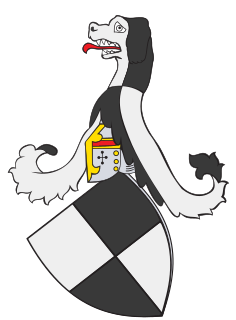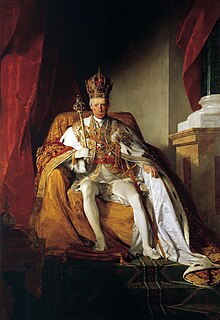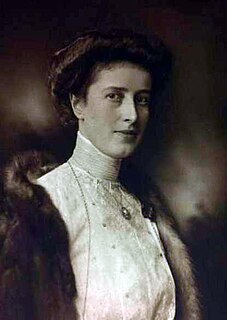
The House of Hohenzollern is a German former royal dynasty whose members were variously princes, electors, kings and emperors of Hohenzollern, Brandenburg, Prussia, the German Empire, and Romania. The family arose in the area around the town of Hechingen in Swabia during the 11th century and took their name from Hohenzollern Castle. The first ancestors of the Hohenzollerns were mentioned in 1061.

Hohenzollern-Sigmaringen was a principality in southwestern Germany. Its rulers belonged to the senior Swabian branch of the House of Hohenzollern. The Swabian Hohenzollerns were elevated to princes in 1623. The small sovereign state with the capital city of Sigmaringen was annexed to the Kingdom of Prussia in 1850 following the abdication of its sovereign in the wake of the revolutions of 1848, then became part of the newly created Province of Hohenzollern.

Kaiser is the German word for "emperor". Like the Bulgarian, Serbian, and Russian word Tsar, it is directly derived from the Roman emperors' title of Caesar, which in turn is derived from the personal name of the Julii Caesares, a branch of the gens (clan) Julia, to which Gaius Julius Caesar, the forebear of the Julio-Claudian dynasty, belonged. In general the German title was only used for rulers over the rank of kings (König).

Wilhelm, German Crown Prince was the eldest child and heir of the last German Emperor, Wilhelm II, and the last Crown Prince of the German Empire and the Kingdom of Prussia. After the death of his grandfather Emperor Frederick III, Wilhelm became crown prince at the age of six, retaining that title for more than 30 years until the fall of the empire on 9 November 1918. During World War I, he commanded the 5th Army from 1914 to 1916 and was commander of the Army Group German Crown Prince for the remainder of the war. Crown Prince Wilhelm became head of the House of Hohenzollern on 4 June 1941 following the death of his father and held the position until his own death on 20 July 1951.

Georg Friedrich Ferdinand, Prince of Prussia is a German businessman who is the current head of the Prussian branch of the House of Hohenzollern, the former ruling dynasty of the German Empire and of the Kingdom of Prussia. He is the great-great-grandson and historic heir of Wilhelm II, the last German Emperor and King of Prussia, who abdicated and went into exile upon Germany's defeat in World War I in 1918.

Prince Wilhelm of Urach, Count of Württemberg, 2nd Duke of Urach, was a German prince who was elected in June 1918 as King of Lithuania, with the regnal name of Mindaugas II. He never assumed the crown, however, as German authorities declared the election invalid; the invitation was withdrawn in November 1918. From 17 July 1869 until his death, he was the head of the morganatic Urach branch of the House of Württemberg.

Louis Ferdinand Victor Eduard Adalbert Michael Hubertus, Prince of Prussia was a member of the royal House of Hohenzollern and the pretender for a half-century to the abolished German throne. He was also noteworthy as a businessman and a patron of the arts.

Prince Joachim Franz Humbert of Prussia was the youngest son and sixth child of Wilhelm II, German Emperor, by his first wife, Augusta Victoria of Schleswig-Holstein. He died by suicide at age 29.

The Order of the Black Eagle was the highest order of chivalry in the Kingdom of Prussia. The order was founded on 17 January 1701 by Elector Friedrich III of Brandenburg. In his Dutch exile after World War I, deposed Emperor Wilhelm II continued to award the order to his family. He made his second wife, Princess Hermine Reuss of Greiz, a Lady in the Order of the Black Eagle.

Prince Oskar Karl Gustav Adolf of Prussia was the fifth son of Wilhelm II, German Emperor and Augusta Victoria of Schleswig-Holstein-Sonderburg-Augustenburg.

Duchess Cecilie of Mecklenburg-Schwerin was the last German Crown Princess and Crown Princess of Prussia as the wife of German Crown Prince Wilhelm, the son of German Emperor Wilhelm II.

The succession order to the throne of the Romanian monarchy, abolished since 1947, was regulated by the monarchical constitution of 1938, suspended by the Royal Law Decree no. 3052 of September 1940 and the 1884 Law of the Romanian Royal House Rules enacted pursuant to the 1866 Constitution of Romania which had confirmed the enthronement of Prince Karl (Carol) of Hohenzollern-Sigmaringen. The 1938 Constitution stipulated Salic law, according to which the throne was hereditary in King Carol I's legitimate descent and, if his male issue failed, in the descent of his brothers of the Sigmaringen princely branch of the House of Hohenzollern, according to agnatic primogeniture and to the perpetual exclusion of females and their descendants. The last monarch to reign in Romania was King Michael I, who was born in 1921, abdicated his throne on 30 December 1947 under coercion, and went into exile in Switzerland. He died on 5 December 2017 in Aubonne, Switzerland.
Prince Frederick or Prince Friedrich may refer to:
Prince Christian-Sigismund of Prussia is one of the three paternal uncles of Georg Friedrich, Prince of Prussia, head of the House of Hohenzollern since 1994, which reigned over Germany until 1918. He is the youngest of four sons born to Louis Ferdinand, Prince of Prussia (1907-1994) and Grand Duchess Kira Kirillovna of Russia (1909-1967). He was the heir presumptive to the headship of the deposed House of Hohenzollern from the death of his father to 20 January 2013, when Georg Friedrich fathered twin sons, relegating Christian-Sigismund to a more remote place in the Line of succession to the former German throne.

Princess Oskar of Prussia, Countess of Ruppin was a German aristocrat and the wife of Prince Oskar of Prussia.

Prince Wilhelm of Prussia was the eldest child of Crown Prince Wilhelm of Germany and Duchess Cecilie of Mecklenburg-Schwerin. At his birth, he was second in line to the German throne and was expected to succeed to the throne after the deaths of his grandfather and father, both of whom, however, outlived him.

Prince Karl Franz of Prussia was the only child of Prince Joachim of Prussia and his wife Princess Marie-Auguste of Anhalt. He was also the grandson of Wilhelm II, German Emperor, himself a grandson of Queen Victoria, which made Prince Karl a great-great-grandson of the British Queen.

Frederick is a masculine given name meaning "peaceful ruler". It is the English form of the German name Friedrich. Its meaning is derived from the Germanic word elements frid, or peace, and ric, meaning "ruler" or "power".

Princess Herzeleide-Ina-Marie Sophie Charlotte Else of Prussia was a member of the deposed House of Hohenzollern. She was the only daughter of Prince Oskar of Prussia and his initially morganatic wife, Countess Ina Marie von Bassewitz. She is the mother of Ernst-Johann Biron, Prince of Courland, the current head of the House of Biron.

The Monarchy of Germany was the system of government in which a hereditary monarch was the sovereign of the German Empire from 1871 to 1918.
















